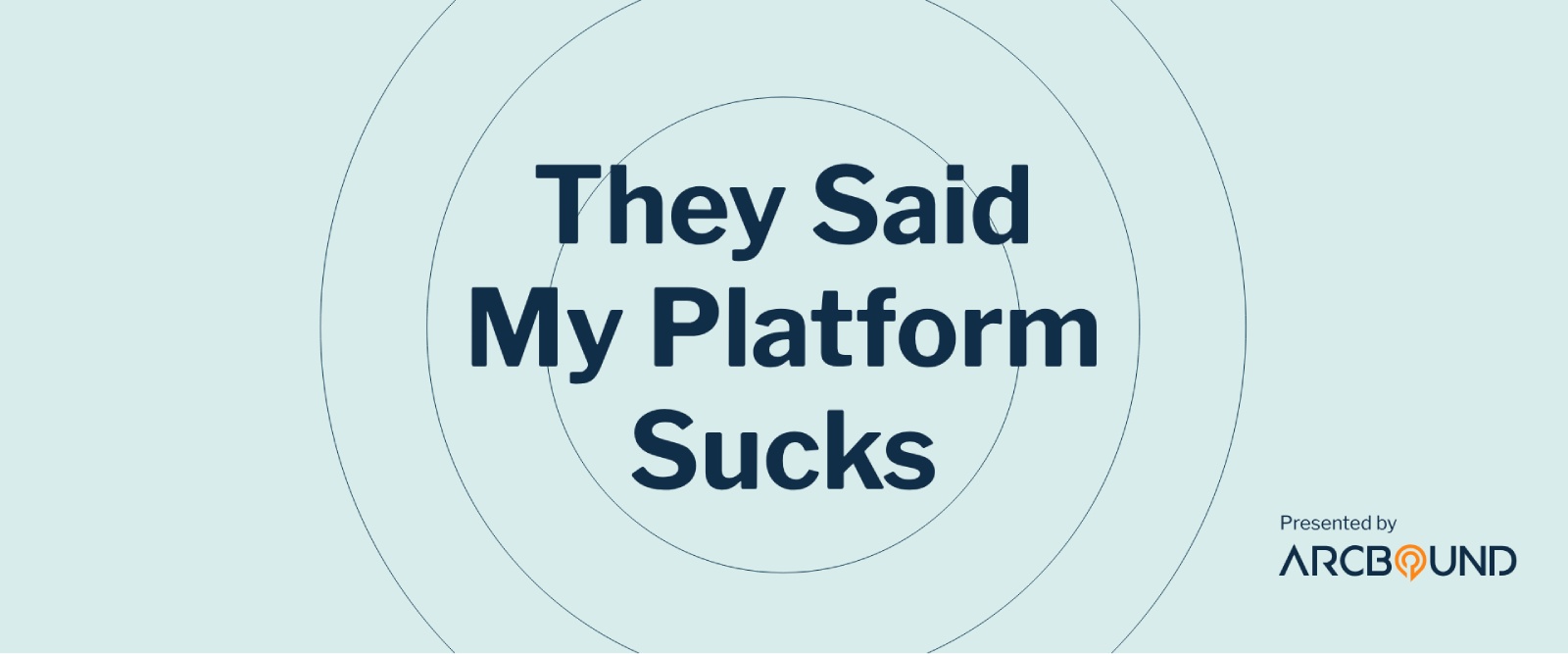They said my platform sucks

Value of Volume?
I was on a call with someone I respect when they told me my social presence sucked.
“Bryan, why don’t you have much of a platform?” they asked. “And how can you expect others to trust you with their online presence when they don’t see enough of yours?”
It was a fair point. I’ve spent the majority of the past five years trying to put together all the pieces of my vision for Arcbound. In the process, lots of other things have fallen off my plate—evenings, weekends, relationships, and yes, my social presence, even though it’s such a large part of the work I do.
It seems like I’m constantly oscillating between different options and the various benefits they offer: strength vs. nimbleness; internal motivation vs. incentives; quality vs. scale, and more. I’m thinking about what’s essential today and what will put me in a better place tomorrow, without rushing too fast to the future. But something’s always gotta give.
Those conversations with myself and with that person have had me thinking about how I show up in the world, how those around me do, the impact we can each make—and what we have to sacrifice in the process.
Value versus volume—it’s a common conundrum that shows up in so many facets of our lives. And all too often, we only find out the hard way: realizing that we’ve wasted time chasing the wrong thing or that we’ve burned ourselves out on stuff that’s “urgent” but not important. In this case, though, thanks to their ^ input, I figured I could start small.
I could apply what my team and I have learned over the past five years to what I put online. As I began surveying the field, checking out the accounts of those who had rapidly grown their audiences, I found myself reflecting on a few things. And they were frustrating.
The first is that volume seems like a necessary evil. Everything moves so fast that post shelf lives have become incredibly short, and that means you’ve got to put more up if you want the chance to be seen. And of course, it’s not just about being seen—others have to “engage,” interacting with what you put up there to encourage the algorithms to have mercy on your content and show it to others.
But a focus on quantity often puts a damper on quality. And that brings us back to my conundrum, and maybe yours too: so many of us have valuable insights to share, but it’s so easy to be drowned out by the crowd.
Can you stand out based on substance, or does volume beat value every time online?
And what about when you’re competing against enterprise brands, those with the resources—and dedicated teams—that generate the kind of volume necessary to keep showing up?
The difficult truth is that you need both and then some: amazing content with substance, enough of it to make a dent in an overcrowded landscape, and the consistency to stay on people’s minds.
And some people are nailing the mix:
Alex Hormozi’s presence is very impressive, especially on LinkedIn. There’s a depth of thought and longevity to everything he does and a lot of great tactics to emulate here. Plus, he makes me feel extremely insecure given his muscle mass. I mean, have you seen the dude?
I also like what Case Kenny has done on Instagram. He’s built a very strong brand without worrying too much about what other people think. And as a result, he’s scaled a major audience, “sharing his feelings for a living,” and killed the self-publishing game.
This last one may seem obvious, but Gary Vaynerchuck continues to deliver great nuggets—especially via audio. He’s constantly shouting in my ear at 9 PM in the gym, but I tend to like it — and want more of it.
All three share real value, show up as themselves, and are extremely consistent.
But what if you have to pick between value and volume? I’d choose value every time.
Why?
Real value is truly scalable. If you can crack the code on value, you can eventually make more of it.
With that in mind, I’m pushing myself to do more—to post more on social media and follow up with regular newsletter content. But I’m refusing to sacrifice value (or at least what I think is valuable). I’m working to make sure each piece of content reflects depth of thought and serves as a means of connection, hoping that what’s meaningful to me will be meaningful for others.
I’m treating it like Ben and Jerry’s: making experiments that taste good to me, that I try to make taste good for you, and then figuring out where I want to double down for a while (Chunky Monkey is a classic for a reason). Different formats, trying things that drive buy-in in new ways, and take that momentum to make new flavors.
Sometimes, I’m going to mess up (“Oh Pear,” anyone? Didn’t think so.) I may miss a post or send something out a day late (ahem, like this newsletter), so be it. But I’ll just keep going.
Transparently, it’s been stressful—and it’s weird to share all this as Arcbound guides other people to share their voice day in and day out. But I think honesty is part of the value game too, and I’m trying to stay true to myself and to you while meeting a higher demand. That takes work, usually an hour of writing every night after a long day and having my amazing team format it to fit the platforms—and strategy—to drive growth.
Like anything, though, tasting some success pushes me to find more. And that’s what I’m after. I know this experiment will make me—and Arcbound—better, without compromising who we are. And if it helps us all suck a little less, I’m here for it.